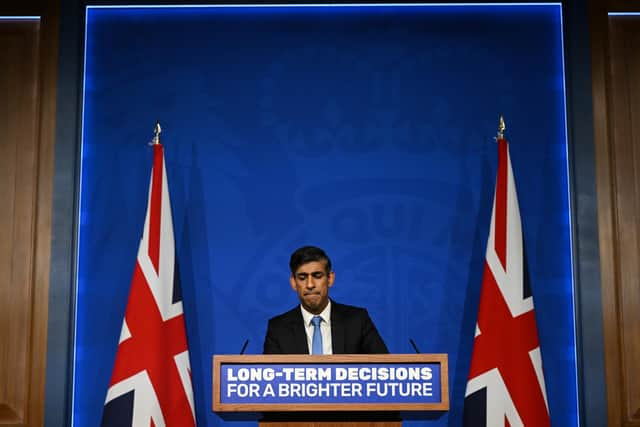Rishi Sunak's net zero delay 'a huge setback to manufacturers', say industry leaders
The leaders of 15 organisations in the sector, including Make UK, the Chemical Industries Association and the British Coatings Federation, have written to the Financial Times to highlight their concerns about the Prime Minister’s decision.
The letter said: “The announcement that the UK government will be watering down some of its net zero policies is a huge setback for manufacturers, who have put transition to net zero at the forefront of their business priorities.
Advertisement
Hide AdAdvertisement
Hide Ad"Manufacturers require stability and confidence in order to invest. Many companies will have spent time and money planning based on firm targets, and we now run the risk of falling behind our international counterparts as a home for green technologies if we persist in frequently altering policies that impact businesses directly.


"Among others, SME businesses in the automotive supply chain will be hit particularly hard.”
The letter added that the UK needs a long-term industrial strategy and suggested a Royal Commission is established so it could survive “short-term political cycles”.
It added: “This announcement sends entirely the wrong signal and suggests if we aren’t looking forward, we are simply going backwards."
Advertisement
Hide AdAdvertisement
Hide AdMr Sunak insisted last week that he was not watering down the UK’s overall target of reaching net zero by 2050, but pushed back the deadline for phasing out gas boilers and petrol cars and scrapped plans to make landlords improve their properties’ energy efficiency.
He said the UK was already ahead of allies in reducing emissions and could not impose “unacceptable costs” on British families.
“The risk here to those of us who care about reaching net zero, as I do, is simple: if we continue down this path we risk losing the consent of the British people,” he said.
“And the resulting backlash would not just be against specific policies but against the wider mission itself, meaning we might never achieve our goal.”
Advertisement
Hide AdAdvertisement
Hide AdThe Prime Minister also faced criticism from some in the automotive sector in response to his announcements.
Ford UK said that the change “undermined ambition, commitment, and consistency”, while Nissan was also critical.
However, JLR said the delay was “pragmatic” while it was also supported by Toyota.
Ian Plummer, commercial director at Auto Trader, said: “The PM has left the industry and drivers high and dry by sacrificing the 2030 target on the altar of political advantage.
Advertisement
Hide AdAdvertisement
Hide Ad“According to our research, only half of people could see how an EV (electric vehicle) could fit into their lifestyle as it is, suggesting major barriers to adoption.
“We should be positively addressing concerns over affordability and charging rather than planting seeds of doubt.
“This announcement has only served to remove trust and confidence in the UK market.”
Another industry leader, the RAC Foundation, said the change contradicted the “huge sums of money” that the Government has already spent on electric battery production.
Advertisement
Hide AdAdvertisement
Hide AdSteve Gooding, director of the transport research organisation, said: “It is hard to understand the rationale for the Prime Minister’s decision to delay the ban on sale of petrol and diesel cars by five years – what message does taking his foot off the gas in this way send to an auto industry that was confident of its ability to hit the 2030 deadline on the basis of a clear and consistent regulatory regime?”
The Government says its policy is about taking a fairer and more pragmatic approach to reaching net zero.
A spokesperson said: “Recent announcements such as Tata’s £4bn gigafactory announcement, Stellantis investing £100mn into Ellesmere Port and BMW putting £600mn into building electric Minis in Oxford is evidence that businesses see the UK as an attractive place to invest and we are committed to working with car manufacturers to make the UK one of the best places for automotive investment.”
Mr Sunak’s decision was praised by former US president Donald Trump, who has railed against climate measures in his country.
Mr Trump said that Mr Sunak had “very substantially rolled back the ridiculous ‘climate mandates’ that the United States is pushing on everyone, especially itself.”